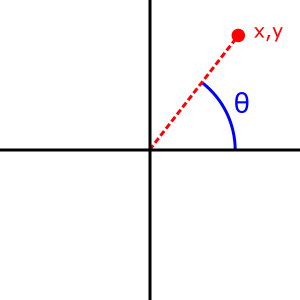Math.atan2()
Baseline Widely available
This feature is well established and works across many devices and browser versions. It’s been available across browsers since July 2015.
Die statische Methode Math.atan2() gibt den Winkel in der Ebene (in Radiant) zwischen der positiven x-Achse und dem Strahl von (0, 0) zu dem Punkt (x, y) zurück, für Math.atan2(y, x).
Probieren Sie es aus
function calcAngleDegrees(x, y) {
return (Math.atan2(y, x) * 180) / Math.PI;
}
console.log(calcAngleDegrees(5, 5));
// Expected output: 45
console.log(calcAngleDegrees(10, 10));
// Expected output: 45
console.log(calcAngleDegrees(0, 10));
// Expected output: 90
Syntax
Math.atan2(y, x)
Parameter
Rückgabewert
Der Winkel in Radiant (zwischen -π und π, einschließlich), der zwischen der positiven x-Achse und dem Strahl von (0, 0) zu dem Punkt (x, y) liegt.
Beschreibung
Die Methode Math.atan2() misst den gegen den Uhrzeigersinn gerichteten Winkel θ, in Radiant, zwischen der positiven x-Achse und dem Punkt (x, y). Beachten Sie, dass die Argumente dieser Funktion zuerst die y-Koordinate und dann die x-Koordinate übergeben.

Math.atan2() erhält separate x- und y-Argumente, während Math.atan() das Verhältnis dieser beiden Argumente erhält. Math.atan2(y, x) unterscheidet sich in folgenden Fällen von Math.atan(y / x):
x |
y |
Math.atan2(y, x) |
Math.atan(y / x) |
|---|---|---|---|
Infinity |
Infinity |
π / 4 | NaN |
Infinity |
-Infinity |
-π / 4 | NaN |
-Infinity |
Infinity |
3π / 4 | NaN |
-Infinity |
-Infinity |
-3π / 4 | NaN |
| 0 | 0 | 0 | NaN |
| 0 | -0 | -0 | NaN |
< 0 (einschließlich -0) |
0 | π | 0 |
< 0 (einschließlich -0) |
-0 | -π | 0 |
-Infinity |
> 0 | π | -0 |
| -0 | > 0 | π / 2 | -π / 2 |
-Infinity |
< 0 | -π | 0 |
| -0 | < 0 | -π / 2 | π / 2 |
Darüber hinaus würde Math.atan2() für Punkte im zweiten und dritten Quadranten (x < 0) einen Winkel ausgeben, der weniger als oder größer als ist.
Da atan2() eine statische Methode von Math ist, wird sie immer als Math.atan2() verwendet und nicht als Methode eines erstellten Math-Objekts (Math ist kein Konstruktor).
Beispiele
Verwendung von Math.atan2()
Math.atan2(90, 15); // 1.4056476493802699
Math.atan2(15, 90); // 0.16514867741462683
Unterschied zwischen Math.atan2(y, x) und Math.atan(y / x)
Das folgende Skript gibt alle Eingaben aus, die einen Unterschied zwischen Math.atan2(y, x) und Math.atan(y / x) erzeugen.
const formattedNumbers = new Map([
[-Math.PI, "-π"],
[(-3 * Math.PI) / 4, "-3π/4"],
[-Math.PI / 2, "-π/2"],
[-Math.PI / 4, "-π/4"],
[Math.PI / 4, "π/4"],
[Math.PI / 2, "π/2"],
[(3 * Math.PI) / 4, "3π/4"],
[Math.PI, "π"],
[-Infinity, "-∞"],
[Infinity, "∞"],
]);
function format(template, ...args) {
return String.raw(
{ raw: template },
...args.map((num) =>
(Object.is(num, -0)
? "-0"
: (formattedNumbers.get(num) ?? String(num))
).padEnd(5),
),
);
}
console.log(`| x | y | atan2 | atan |
|-------|-------|-------|-------|`);
for (const x of [-Infinity, -1, -0, 0, 1, Infinity]) {
for (const y of [-Infinity, -1, -0, 0, 1, Infinity]) {
const atan2 = Math.atan2(y, x);
const atan = Math.atan(y / x);
if (!Object.is(atan2, atan)) {
console.log(format`| ${x} | ${y} | ${atan2} | ${atan} |`);
}
}
}
Die Ausgabe ist:
| x | y | atan2 | atan | |-------|-------|-------|-------| | -∞ | -∞ | -3π/4 | NaN | | -∞ | -1 | -π | 0 | | -∞ | -0 | -π | 0 | | -∞ | 0 | π | -0 | | -∞ | 1 | π | -0 | | -∞ | ∞ | 3π/4 | NaN | | -1 | -∞ | -π/2 | π/2 | | -1 | -1 | -3π/4 | π/4 | | -1 | -0 | -π | 0 | | -1 | 0 | π | -0 | | -1 | 1 | 3π/4 | -π/4 | | -1 | ∞ | π/2 | -π/2 | | -0 | -∞ | -π/2 | π/2 | | -0 | -1 | -π/2 | π/2 | | -0 | -0 | -π | NaN | | -0 | 0 | π | NaN | | -0 | 1 | π/2 | -π/2 | | -0 | ∞ | π/2 | -π/2 | | 0 | -0 | -0 | NaN | | 0 | 0 | 0 | NaN | | ∞ | -∞ | -π/4 | NaN | | ∞ | ∞ | π/4 | NaN |
Spezifikationen
| Specification |
|---|
| ECMAScript® 2025 Language Specification # sec-math.atan2 |
Browser-Kompatibilität
BCD tables only load in the browser